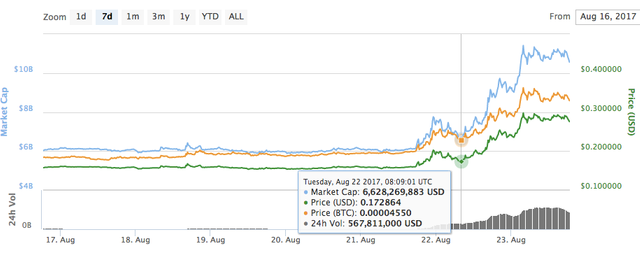Digital Currency Ripple Soars 70% Overnight
The cryptocurrency Ripple shot up dramatically in the last 24 hours, climbing to nearly 30 cents from yesterday's price of around 17 cents. The price surge also saw the total value of Ripple grow to $11 billion, briefly making it the third most valuable digital currency behind bitcoin and Ethereum.
For those unfamiliar, Ripple is like a corporate cousin to bitcoin. It relies on blockchain software to create a permanent, indelible transaction record but, unlike many crypto-currencies, it is controlled by a company rather than mined.
The chart below, courtesy of CoinMarketCap, shows what happened yesterday. After staying flat at around 16 cents for most of the week, the price of Ripple (whose currency is also called XRP) began to shoot up until it nearly doubled:

CoinMarketCap
The price has since retreated to around 23 cents as of Wednesday afternoon ET, and Ripple has dropped to fourth on the list of most valuable crypto-currencies.
The exact explanation for the price surge is unclear, but the trade publication Coindesk and others have noted the increase coincides with heavy trading of XRP on exchanges in Korea.
RELATED
Bitcoins As Digital Currency's Rally Crushed Every Other Currency in 2016
THE LEDGER
Bitcoin Price Falls Sharply After Reaching $5,000 High
In an interview with Fortune, Ripple CEO Brad Garlinghouse said the role of specific events is overstated in assessing the value of XRP. Instead, he attributed the currency's value to its usefulness for processing transactions, and its ability to provide liquidity for big banks.
As Garlinghouse noted, many big banks are customers of Ripple, and are using its software to help transfer money among themselves. The appeal for banks is that Ripple offers a secure and hyper-fast transfer process compared to existing financial infrastructure, much of which was designed in the 1960s.
Get Data Sheet, Fortune’s technology newsletter.
One question mark, however, is what role XRP will play in the future. When Ripple debuted, it provided a way for people to transfer any sort of currency for any other (such as dollars to euros or yen to bitcoin), but required them to spend XRP to complete the transaction. But as banks began to license Ripple software to transfer money to each other, some asked why it was necessary to use XRP at all.
Garlinghouse says XRP is useful for banks as a pool of liquidity. Meanwhile, other reports note that Ripple sells XRPs to big banks at a discount to encourage them to use it and to act as market makers, while the company also sells additional units of the currency on the open market. (Update: Ripple has since clarified that it offers XRPs to big banks to encourage them to use it, and has also sold it a discount to hedge funds and others to act as market makers.)
All of this may amount to extra consideration for those considering Ripple as an investment. Like other digital currencies, XRP has been on a remarkable run in the past year as speculators look for alternatives to bitcoin, and as sophisticated investors like hedge funds turn to so-called "alt-currencies" as a new asset class. Overall, the current value of all digital currencies is well over $100 billion.
Hi! I am a robot. I just upvoted you! I found similar content that readers might be interested in:
http://fortune.com/2017/08/23/ripple/